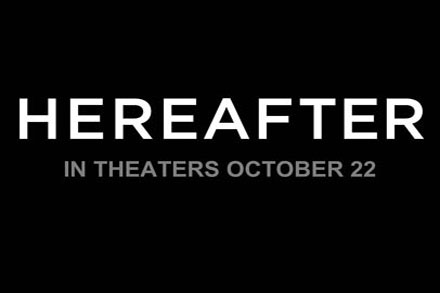
The pre-release reviews of Hereafter, the new Clint Eastwood directed movie, were quite mixed. They ranged from “soul stirring” to “spiritual baloney-ism.”
“Clint Eastwood’s Hereafter considers the idea of an afterlife with tenderness, beauty and a gentle tact.” wrote Roger Ebert of the Chicago Sun-Times
“It has the power to haunt the skeptical, to mystify the credulous and to fascinate everyone in between,” A. O. Scott of the New York Times wrote.
“The move drags, yet it feels like it’s missing an hour. It features three characters on three continents who barely interact with one another. And after 130 minutes, it stops without concluding,” Kyle Smith of the New York Post offered.
“This Hereafter, despite the odd engaging moment, is a terrible letdown, like investing in a belief system and discovering there’s no “here” that you’ve been after all your life,” was how Roger Moore of the Orland Sentinel saw it.
I have to side with the last two reviewers. It was very disappointing. More than anything it lacked philosophical depth. It had nothing to do with the “hereafter,” such as the movie When Dreams May Come, starring Robin Williams, did some years ago. The viewer can infer a hereafter because George (Matt Damon) is a clairvoyant and/or clairaudient who can see and hear from the dead, but the afterlife, per se, is never really discussed.
The move begins with a very poor depiction of a near-death experience by Marie, a French journalist. All it shows is, as one reviewer put it, “indistinct figures milling round in front of a white light.” The viewer unfamiliar with the fascinating stories related by near-death experiencers is left to wonder how such a drab image could have impacted the woman so much that she lost interest in earthly matters and wanted to write about her experience. Why couldn’t they have shown Marie entering a tunnel, being greeted by a deceased loved one, seeing her life played back before her in an instant, coming to understand life’s drama, and then being told it is not her time and that she had to go back?
When we meet George we find out that he has clairvoyant abilities but wants nothing further to do with them because his prior occupation of giving clairvoyant readings caused him to think too much about death and thus not enjoy life. This is a false premise, since most clairvoyants and others who understand and embrace death are able to better appreciate and enjoy life. They no longer have a need to escape from the real world in the way most people who fear death do. No doubt there are some who are unable to put things in perspective and may react as George did, but the uninformed viewer is likely to assume that embracing death is mentally unhealthy, when, in fact, it is the healthiest thing one can do.
George gives three readings during the movie, none of which was particularly moving. The first was apparently comforting to the man, although it offered nothing more than scant evidence that his wife had survived in spirit. The second was very disturbing to the person, and third – that given to a young boy whose twin brother had died – was evidential but lacking in compassion. At no time does George ever give any clue that he has integrated his gift into a spiritual philosophy. As reviewer Sally Kline of WashingtonExaminer.com states, “it pussyfoots around the larger issue it raises.”
If the movie was meant to enlighten or inspire, it failed badly. It offers no explanations as to difficulties in the clairvoyant process, nor did it discuss the obstacles that discarnates have to overcome in communicating. One is left to conclude that the deceased are floating around on clouds with mobile phones in hand and that is what the afterlife is all about.
The ending scene leaves us with the idea that we are all interconnected in some cosmic way, but that is about the extent of the movie’s inspiration.
|